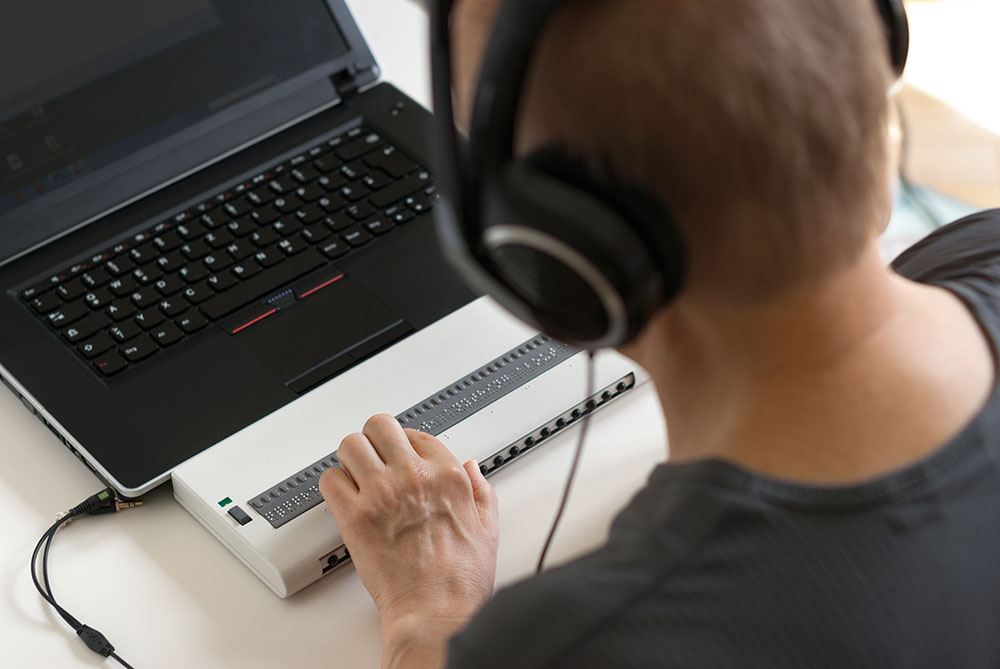FY2024 Accomplishments
Throughout FY2024, the ITS Accessibility team worked tirelessly to ensure that all digital resources and technologies used across the university are accessible to everyone in the U-M community. This team worked to identify and address accessibility gaps in digital service delivery, shared best practices in DEI and IT, and raised awareness about the importance of digital accessibility.
Accessibility in Generative AI
On August 21, 2023, U-M launched U-M GPT. At the time of its launch, thanks to the work of the ITS Accessibility team, U-M GPT was believed to be the first accessible web chat interface of its kind designed to send prompts to GPT-4 and other large language models.
U-M GPT incorporates several accessibility features, including:
- high contrast between text and background
- keyboard navigability for all interactive elements
- clear visual keyboard focus indicators
- descriptive label text
- optimized usability with screen readers
- ARIA implementation for dynamic content management
- content and controls that reflow appropriately.
A dedicated team of the university's accessibility experts and web developers engineered the platform to meet WCAG 2.1 AA standards and seamlessly integrate with assistive technologies to serve users with disabilities. The teams engaged in an intensive iterative process, with each release triggering an accessibility review. The identified improvements from the review were then applied and checked in the subsequent iteration. Accessibility experts and developers often worked together in real-time sessions to address and confirm solutions to accessibility issues. Recognizing the significance of the product, accessibility team members conducted separate final evaluations, then jointly analyzed their findings, shared insights, and consolidated feedback for the developers.
The team completed the secure, equitable, and inclusive platform in an impressive two-month period, aligning its debut with the start of the new academic year. U-M GPT sets itself apart by eliminating prevalent accessibility obstacles, showcasing the university's commitment to offering innovative solutions that encompass the needs of its entire academic community.

Assistive Technology Tools Enhance Digital Accessibility
In FY2024, U-M prioritized improving digital accessibility, acknowledging its wide-reaching benefits for the entire campus community. For blind and low-vision users, assistive technology tools including JAWS, ZoomText, and Fusion are invaluable. Last year, ITS acquired new licenses from Vispero to enhance access to JAWS (screen reader), ZoomText (magnifier), and Fusion (a combination of both tools). ITS’ licensing agreement allows the university to make these tools available at no additional cost to current U-M students, faculty, and staff.
The Vispero license affords several additional benefits, including:
-
Broad Access: Permits limitless installations on UM-owned and personal Windows computers for all current students, faculty, and staff, across all four campuses under ITS’ license.
-
Cybersecurity: Ensures access to the latest software updates and critical security patches.
-
Cost Savings: The licensing model maintains consistent pricing throughout U-M and allows the use of ITS' license without additional charges.
Additional Accessibility Trainings in FY2024
-
In FY2024, the ITS Accessibility team released 10 new digital accessibility training modules and conducted 3 synchronous “Introduction to Digital Accessibility” sessions in collaboration with U-M Organizational Learning.
-
350+ learners attended synchronous introduction to digital accessibility course
Starting in FY2024, the ITS Accessibility team began offering a suite of Digital Accessibility training courses tailored to help individuals in the university community incorporate accessibility into their daily tasks. These resources are designed for everyone, emphasizing that each person has a role in fostering an accessible digital environment at U-M. The offerings include practical “How-To” guides for quick reference, expert advice on best practices, concise courses to enhance understanding and skill application, thorough explanations of university procedures and policies, creative workarounds to meet diverse access needs, and foundational learning on central accessibility concepts. Through these trainings, the U-M community can collectively enhance the accessibility of its digital landscape.
Testimonials from FY2024 Accessibility Workshops
“I also love how this workshop models your advice of making everything available in different formats. Thanks so much!”
“I loved the session on creating accessible presentations - I will enable captions, utilize alternate text for images and more…”
“Accessibility presentation by Jane B-V was excellent. Useful instructions, walks the talk. Shared useful resources that I will use.”
Servicing the U-M Community’s Accessibility Needs
In FY2024, the ITS Accessibility team diligently addressed the digital inclusivity needs of the campus community through their completion of 88 requests, encompassing consultations, responses to inquiries, and providing support, reflecting a high level of engagement and responsive service.
They also conducted 39 expert evaluations of various products and applications to ensure these tools met the necessary standards for accessibility.
Moreover, they actively participated in 13 collaborative efforts on development or purchasing projects, signifying their commitment to integrating accessibility considerations into the university's digital infrastructure right from inception to deployment.
This robust involvement underscores the team's ongoing effort to uphold and enhance accessible practices within the university.
Making ITS Services Accessible
ITS has greatly enhanced its services by embedding accessibility within its core operations. This improvement includes new accessibility-focused internal training and updated procedures. Additionally, ITS has introduced accessibility details in its internal Service Catalog, allowing the organization to track and improve accessibility for its 80+ user-facing services, and marking a commitment to inclusivity and better service for all.
